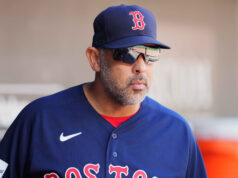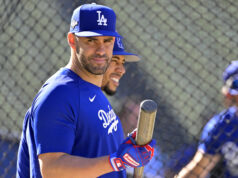It is dangerous to place so much stock in Pro Football Focus’ grading system. Several players and coaches provide insight into the issue.
In a startling interview with Pete Prisco of CBS Sports, New York Giants offensive lineman Weston Richburg opened the floodgates about Pro Football Focus.
“On Twitter, I get tagged in so much PFF (Pro Football Focus) stuff,” Richburg said. “You hear this stuff, but you have to look at the source. Most of these people who talk about offensive line play don’t know anything about offensive line play. … My rookie year I was really low in PFF. Last year, I got better. People tagged me (on Twitter) both years. I don’t want to hear either side of it. I know how I am doing. It causes a bunch of clutter in my mind. It’s the wrong source.”
The popular saber-metrics site has gained plenty of notoriety over the past couple of NFL seasons for providing player grades and premium stats. They sit and watch and grade each player on each play, obtaining this game film from NFL Rewind.
Despite football writers citing them perpetually as the end-all, it is dangerous to put so much stock in PFF.
The reasons for this are threefold:
1. The eye test has always been the most effective method of analyzing players:
In late September, Aaron Rodgers went 24-for-35 for 333 yards, five touchdowns and no interceptions against one of the league’s best defenses. As Shalise Manza Young noted in an article for Yahoo Sports, the idea that he garnered a -0.8 rating from PFF is mind-boggling. It doesn’t take a superfan to comprehend that the Pack’s quarterback had an excellent game, which is why the website’s grading system can be so skewed.
2. Watching film and drawing conclusions from it isn’t healthy:
New England Patriots head coach Bill Belichick discussed the dangers of doing so in 2013:
It might even look to us like somebody made a mistake but then we look at it more closely maybe somebody besides him made a mistake and he was trying to compensate. I think we need a little closer analysis a lot of times. Sometimes the play calls or what was called on the line of scrimmage might be something that we’re not aware of. That could happen in any game. You think a player did something that he shouldn’t have done but maybe he got a call, a line call or a call from a linebacker or he thought the quarterback said something so he did what he thought was the right thing or maybe it was the right thing but that call shouldn’t have been made or should have been on the other side. But yeah, I think we need to be careful about what we’re evaluating.
So team’s sometimes have trouble dissecting film. How is a website based in the UK going to perform any better?
But believe me, I’ve watched plenty of preseason games this time of year and you’re looking at all the other teams in the league and you try to evaluate players and you’re watching the teams that we’re going to play early in the season and there are plenty of plays where I have no idea what went wrong. Something’s wrong but I don’t…these two guys made a mistake but I don’t know which guy it was or if it was both of them. You just don’t know that. I don’t know how you can know that unless you’re really part of the team and know exactly what was supposed to happen on that play. I know there are a lot of experts out there that have it all figured out but I definitely don’t. This time of year, sometimes it’s hard to figure that out, exactly what they’re trying to do. When somebody makes a mistake, whose mistake is it?
3. It wasn’t physically possible for PFF to watch every player on every play:
The NFL only recently added the coaches film to Rewind, meaning that PFF was only able to work with parts of the field before that. How can the site grade Richburg when the camera doesn’t feature him? Their dedication is commendable, but not without some caveats.
While there is some merit and value in Pro Football Focus’s grading system, it’s dangerous to view it as the end-all.













